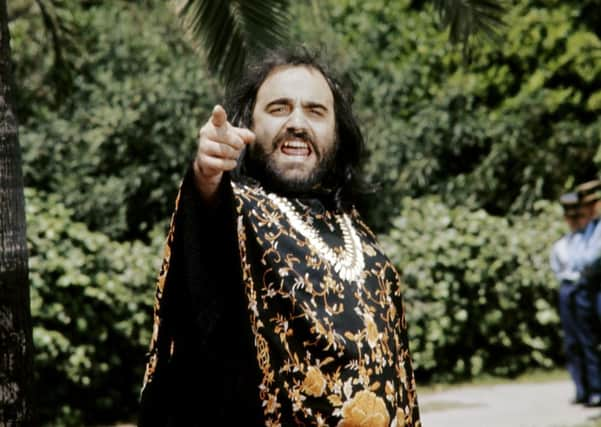Obituary: Demis Roussos, singer


Demis Roussos, singer. Born: 15 June, 1946, in Alexandria, Egypt.
Died: 25 January, 2015, in Athens, aged 68.
His burly frame and flowing hair and beard marked Demis Roussos out as a performer who was at once recognisable. When he started to sing with that idiosyncratic and melodious voice he enchanted audiences the world over. He became popular in the 1970s and sold more than 60 million records worldwide – his hits included Forever and Ever, Quand je t’aime and My Friend the Wind. His fame dated from 1968 when he recorded with Aphrodite’s Child, a group of Greek singers that also included Vangelis.
Advertisement
Hide AdAdvertisement
Hide AdRoussos gained a wider fame for his off-screen role in Mike Leigh’s 1977 TV play Abigail’s Party, for which he provided the soundtrack. Alison Steadman’s character Beverly repeats his name constantly and asks the other guests: “Does anybody mind if I play Demis… he doesn’t sound fat.”
Artemios “Demis” Ventouris Roussos was born in Alexandria where his Greek father and Egyptian mother ran an engineering company. During the 1956 Suez Crisis the family lost all their belongings and returned to Greece.
From an early age Roussos sang with local groups in Athens. When he was 17 he met Evangelos Papathanassiou (later to win fame as the composer Vangelis who wrote the music for the movie Chariots of Fire and Blade Runner) and they formed Aphrodite’s Child.
In Paris they issued Rain and Tears, which was a reworking of Pachelbel’s Canon. It was an overnight sensation in France and in 1969 they recorded I Want to Live, which was an arrangement of the song Plaisir d’amour.
Roussos’ distinctive voice added a sense of musical charisma to the early recordings: the band had built a reputation for cross-overs and were equally at home singing ballads, country songs or heavier, almost rock’n’roll numbers.
In 1970 they recorded in London and the album, It’s Five O’Clock, included another hit – Let Me Love, Let Me Live which was followed later that year by Spring, Summer, Winter and Fall.
There was a certain friction in the band and the record producers were keen to promote Roussos as a solo artist. The album, in fact, sold well but in 1972 Roussos signed a solo contract and issued We Shall Dance and Aphrodite’s Child split up.
Roussos toured widely and built up a trans-Europe reputation for easy-listening music and fondly memorable melodies. Other hits were My Friend the Wind, Velvet Mornings, Goodbye and Lovely Lady of Arcadia.
Advertisement
Hide AdAdvertisement
Hide AdHis first UK single to top the charts was in 1975: Happy to be on an Island in the Sun and the BBC TV producer John King suggested they made a documentary together. The Roussos Phenomenon was shown in 1976 and many of the numbers were issued separately and entered the charts.
Roussos became a popular figure on television light entertainment shows and his warm and gracious personality was popular with a wide audience. He was particularly successful on such programmes as The Basil Brush Show and The Dame Edna Experience.
His weight was becoming a problem – he invariably wore a colourful V-necked kaftan on stage which camouflaged his considerable frame.
Roussos was dubbed the King of the Kaftans and in 1980 he hit headlines when he lost 50kg in ten months. Two years later he co-authored a book called The Question of Weight.
In 1985, Roussos was involved in a major drama when he was travelling from Athens to Rome and his plane was hijacked by members of Hezbollah and Islamic Jihad.
It was his 39th birthday and he and his wife were held prisoners for five tortuous days before they were released. At a press conference afterwards Roussos thanked his captors for presenting him with a birthday cake.
Roussos’s music typified balmy summer evenings with a glass of wine in the hand and dinner on the sea shore as the sun set. There was a charm and warmth about him that was relaxing, familiar and unashamedly romantic.
As he himself told The Scotsman: “The reason for my big success in England was the Brits – they started wanting to go on holidays, like Spain and Greece. My music came right on time.
Advertisement
Hide AdAdvertisement
Hide Ad“It was romantic Mediterranean music addressed to all the people who wanted to go on holiday. My music was liked by the people.”
Roussos continued to tour throughout Europe – his last extensive tour of the UK was in 2002 when he played both Edinburgh and Glasgow – and his last public appearance was in Athens in 2013 when he received the Legion of Honour.
Undoubtedly, it will be the much-loved haunting Forever and Ever, his 1973 hit, for which he will be best remembered.
His solo voice was a wonderful amalgam of traditional Greek folklore, a controlled falsetto and genuine musicianship. They combined to magnificent effect and charmed millions.
Alasdair Steven